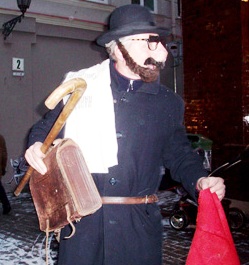
A parade participant in the Vilnius Uzgavenes holiday celebration.
Not really sure what to say about this one, other than Sweet Jesus, I didn’t realize Borat was a documentary.
During Carnival – or Uzgavenes, as it is known in Lithuania – Catholics from around the world congregate for a feast of foods prohibited during Lent. The festival usually involves a parade or circus, with attendees in masks and costumes. But in Vilnius – commonly known to Jews as Vilna – participants traditionally dress and act “as Jews,” a feat that generally calls for masks with grotesque features, beards and visible ear locks and that is often accompanied by peddling and by stereotypically Jewish speech.
Perhaps even more shockingly, the “festivities” extend beyond the parade itself and into a Halloween-style trick-or-treating. When Simonas Gurevicius, the 26-year-old executive director of the Jewish Community of Lithuania, opened the door to his house during last year’s Uzgavenes, he was greeted by two children dressed in horns and tails, reciting a song that translates as, “We’re the little Lithuanian Jews/We want blintzes and coffee/If you don’t have blintzes/Give us some of your money.” (It rhymes in Lithuanian.)
Not content to stick only to anti-Semitism, religious bigots in Vilnius also target the Roma population. Roma, also known as “gypsies,” are favorite punching bags all over Europe; Vilnius is apparently no exception to the disturbingly popular anti-Roma sentiments.
The Roma do not fare better. Participants who masquerade as “Gypsies” wear gaudy makeup, hold babies and ask bystanders for money.
Last Friday, Vilnius’s Center of Ethnic Activity hosted an exhibition of Uzgavenes masks and screened archival footage of past celebrations. Masks of Jews were displayed between those of witches and animals, and shown with no apparent compunction to cultural delegates from Latvia and Denmark. In a video shot in Vilnius last year, a man dressed as a Jew carrying a briefcase full of toilet paper haggled with cab drivers as he led a group of people made up as beasts through the streets.
“From my point of view,” said Svetlana Novopolskaja, director of the Roma Community Centre of Vilnius, “Lithuanians like to dress as Roma, like their music and habits, but don’t like Roma as people. They accept them as personages from fairy tales – as hobbits, for example – and are surprised and afraid when they meet real Roma.”
Ethnologist Inga Krisciuniene, who works at the Centre of Ethnic Activity, led the event, explained how she believed that in earlier times, Jews and Gypsies dressed alike. Revelers wore the same mask on Uzgavenes to depict them, so that the characters were distinguishable only by performers’ actions. When asked whether it could be seen as offensive to mock these minorities, Krisciuniene replied, “No one has ever complained.” The intent, she said, is humorous.
“Besides,” she added, “it’s true that Gypsies steal.”
In other words, “It’s just a joke! Except it’s true.” Charming.
Thanks to Nicholas for pointing me to this story.